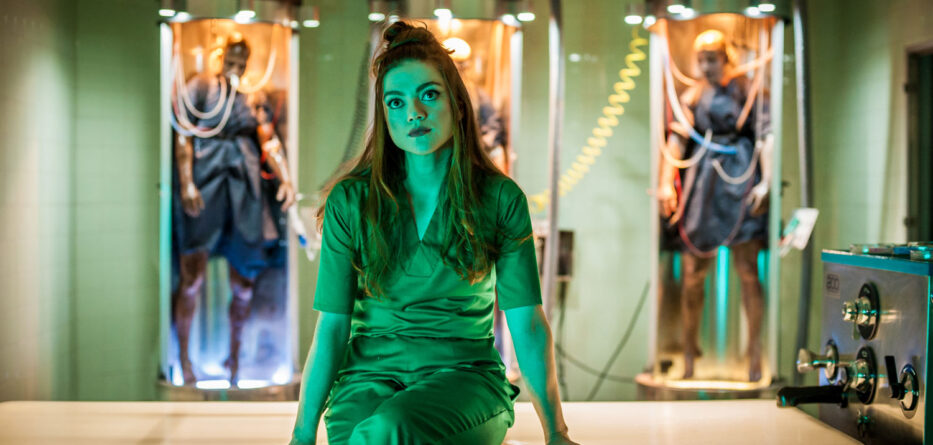Arturo Hilario
El Observador
Mexican-American Brothers and filmmakers Diego Hallivis and Julio Hallivis have written a personal but escapist horror-comedy that echoes real life immigration horrors experienced in the US.
The introduction to the film shows real American news footage, along with the voice of former president Donald Trump talking about how terrible the state of the country was during his much-criticized 2017 inauguration speech.
Throughout his run for presidency and through his four years in office, Trump never stopped repeating the claims of undocumented immigrants ‘infesting’ the country, a wasteland of closed down factories and out of control crime in the cities.
From the start, the former commander in chief envisioned a nightmarish version of the USA, and with this vision came his ‘solutions’.
American Carnage, the new film by the aforementioned Hallivis brothers, brings a twist to the very ideas set forth by Trump and the actual legislation he put into place to separate families, cause havoc on the border and vilify Latinos in this country, whether they were undocumented or not.
The movie tells a story of governor who passes an executive order that rounds up the children of undocumented immigrants into camps, giving them the choice to stay indefinitely in their cages with their aluminized blankets or ‘volunteer’ at a nursing home where they can work off their way to freedom by assisting the suspicious all-white staff.
Recently co-writer and director Diego Hallivis along with principal actress Bella Ortiz answered some questions about American Carnage, from how it manages to tell truths with its horror-comedy metaphors, what it was like working amongst a mainly Latino cast, and why Latinos should be allowed to tell more diverse stories in Hollywood.
Also starring Jorge Lendeborg Jr., Jenna Ortega, Allen Maldonado, and Eric Dane, American Carnage is now in theaters and available to stream.
Hi Diego, to start off I wanted to know what the goal for you and your brother was when you were writing this, and what you wanted to convey with the themes and story in American Carnage?
Diego Hallivis: This is a very personal film in the sense that when the inception of this idea came about, it came from the frustration of what [we] we’re seeing. The way that we live in the United States and sometimes the harsh reality of how Latinos get treated. It’s tough to swallow. So what we wanted to do was to tell a story that showed diversity within the Latin community, but at the same time it had a message, but it wrapped up with genre. It’s using horror and comedy, so then that way the political commentary that we’re doing becomes a fun experience.
I didn’t want to have a film that felt too overly dramatic. There’s some out there that kind of deal with immigration and stuff like that. But then when you watch them, they’re so depressing to watch that even myself, I’m going to turn this off, it’s just kind of like ruining my mood. So I wanted to have something that felt like a comedic and horror experience. So then that way it’s fun instead of preaching.
Could you talk a bit about the title? It brings up memories of the 2017 presidential inauguration speech, and I was wondering if that was a starting point for you and your brother putting this together, or did you have the idea brewing beforehand?
Diego: No, it definitely came from Donald Trump using it because it’s such a visceral word, American ‘carnage’. And as you know, there’s a play on words when it comes to the movie. So it was always going in that direction, using that sort of like a goal post.
I was wondering what your process was or, what the criteria was for choosing to balance out the horror and the comedy elements for American Carnage?
Diego: Yeah, so the idea was to be able to have a layer removed from reality in order for us to have an exaggerated storyline that then becomes very obvious, about what is the subject matter that we’re talking about. And horror and comedy, they share in common the involuntary reaction of, let’s say, if it’s a jump scare, you kind of scream and you jump. And if there’s a joke, you laugh, but you’re not planning on laughing or you’re not planning on reacting that way. They’re kind of like involuntary responses. And when you marry the two, you are able to then have a very intense experience. But it’s also a fun one. It’s one that you enjoy.
So I wanted to make sure that when you watch the film, you had a good time doing so, but then at the end, you had enough to start a conversation if you watched it with someone else or you want to recommend it to someone.
Was there any other real-world situations or film inspirations that helped you craft this dystopian situation?
Diego: Well, you say dystopian, but at the same time, [in] the opening of the film, you see a lot of real-life footage. So one thing that we wanted to do was use those moments that are embedded in reality and use it as a catapult to then create our dystopian scenario, but always having enough of a connecting thread to reality in order to make it just weird enough.
What were any challenges you might have had in writing or filming this project?
Diego: We shot it in Spain, so a lot of it was finding the right locations in order to make it look like we’re in the United States. And then at the same time, you’re always battling against the elements, you’re always battling against time. It was a very heavy movie when it comes to prosthetics, so the makeup took a lot of time, and sometimes that takes away from the time you have for filming.
So then you have to be very efficient. You need to be able to show up to set and you have a shot list with 20-30 shots you want to pull off by the end of the day. But then, because of the time constraints, because of the makeup, you only have about half the time. So you need to be very methodical about how to shoot it.
And what was it like working with the cast? You’ve got these fresh faces; you’ve got established actors like Eric Dane. It’s a good mixture of diverse actors.
Diego: Well, I have to say that a lot of it has to do with luck, because you never plan what the chemistry is between them. You can’t just hope for the best ones to cast the film. And I was lucky enough that the ensemble was able to get along with each other and have this chemistry that even when we were not shooting, they were clearly having a friendship amongst themselves, which allowed then for certain moments when we were filming for certain moments of improvisation that actually ended up elevating the film because of the chemistry amongst them. So that you can never plan for. But I was very lucky and blessed to be able to have it that way.
And last question, Diego. Thanks so much for the time. What do you hope that audiences take away from American Carnage?
Diego: I think audiences should take away from this film fact that there are still lots of stories and types of films as Latinos that we can make that we’re not really given the opportunity to tell. I feel like sometimes we’re kind of, like, pigeonholed in terms of what types of stories we’re allowed to tell by the industry. So what I want to do is kind of present this movie as a version of different things that are available and hopefully, with this, inspire other people to use horror and comedy as a way to infuse Latinos into those types of stories.
But also prove to the world that we’re not cookie cutter and we’re not a monolithic culture, that we have a lot to share, we have a lot to offer. And this is just the beginning.
Hello Bella. To start off, I wanted to ask if you could talk about your role of Micah and what you initially liked about the script and the role itself?
Bella Ortiz: Yeah. So originally, I had auditioned for a different role, and the role of Micha was presented to me. And at first, I had a little bit of hesitation, but the more that I sat with the character and reflected on it, I saw that I had a unique opportunity to play the character because we both are very similar in terms of our starting point of being white Latinx women.
And although my personal life is very different from the life of Micha’s, I saw it as a unique way to kind of be able to use that as a starting point to kind of wonder and be imaginative, [what] if my life had taken a different route and what that would be like. So once I had that kind of like, hook in it, I was able to really see what I could bring to the character.
I wanted to know what the experience was of actually filming it with the rest of your fellow castmates, mainly other Latinx actors. And although it is, like you just mentioned, this certain type of movie, it does connect back to real threads in our politics, in our world. So I was wondering how that experience was of you as a group making this film?
Bella: At first I was a little anxious in not knowing what to expect because I knew that coming in, this was my first principal role in a feature film. And so coming in, I kind of knew that I was a little less seasoned than everyone else.
But as soon as I got to set and I met the rest of the cast mates, I think, because all the principal cast are Latinx and from different backgrounds in different countries and cultures, I think that [diversity] was really like a tether that we all had. Everything, like the chemistry between us, like the rapport, there was nothing forced. It was just all very natural, and I think it’s because we had that common goal and priority to really be vessels in this storytelling of something that’s near and dear to us, that we feel passionate about and that we don’t often see represented in the media.
Now that the film is out, have you gotten any feedback on it?
Bella: I haven’t seen it yet but with the people that I’ve spoken to that have watched the movie, it’s really interesting because I think that since it is such a unique project and it doesn’t really fit in any kind of already established genre, I think people going into it don’t really know what to expect. And when you’re unclear about that and you don’t know what to expect, I think you kind of err to the side of, “I don’t know if I’m going to like this because I can’t necessarily categorize it.”
But the response has been really positive and almost, I think, better because since they don’t know what to expect, it’s almost like you enjoy it a little bit more. So yeah, I’ve been really enjoying hearing people’s responses and reactions to it and at the end of the day, it’s hard to get projects done, especially projects with this subject matter. And I hope that everyone who watches it is just open to that. And also, they go in with the intention of supporting projects done by Latinx artists.
Because I feel like the more that we show up for those, the more that we show Hollywood that there is a need and there is a market for these types of projects to be done so that more can be funded in the future.
What do you hope that audiences take away from American Carnage?
Bella: I hope that people laugh and they find some sort of comfort and entertainment because I think that especially with the horror genre, you can really elevate things. And I love that this movie has a comedy lining and aspect to it because I think the world is harsh sometimes and life can be tough. And I think that it’s important for us to try to find lightness whenever we can.
So I hope that people are challenged to think about the things that are taking place in the world, but at the same time able to kind of in community and with one another laugh at it too. Not to make light of it, but it’s almost like when something is so ridiculous, you just can’t help but laugh. And I think that in a way that can be empowering to then take action.






